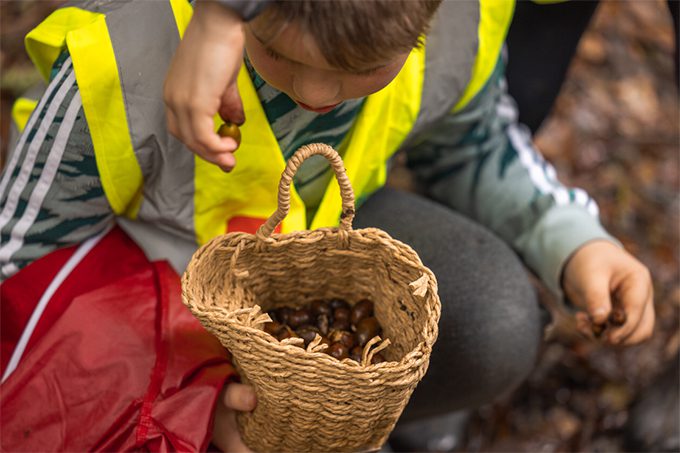Thanks to the many volunteers from our funding organisations, local communities and Second Class pupils from St. Saviour’s National School in Co. Wicklow for taking part in our Acorn Gathering events in Co. Wicklow and Co. Sligo this October.
On the 18th and 19th of October, The Nature Trust organised acorn collections at Ballygannon Woods in Co. Wicklow with support from Native Events. Ballygannon Wood is a very old native Oakwood, almost certainly Ancient in origin. Here there was a ‘mast’ year, which means that the oak trees produced a big crop of acorns. As acorns are big seeds, this doesn’t happen every year, because the trees only have energy to do this from time to time, usually every 5 – 7 years. There are various factors that affect masting which can be very fickle, especially local weather conditions in the current and past year.
At Ballygannon Wood we collected just over 150 kilos of acorns, still leaving lots behind for the squirrels, badgers, deer, jays, rooks, shrews and mice. These acorns were bagged and sent to the Coillte tree nursery at Ballintemple, Co. Carlow to be weighed, graded, dried, stored and subsequently germinated to produce oak seedlings. They will be grown on at the nursery until they are 2 to 4 years old, when they will be ready to be planted out to create new native woodlands on lands already purchased by The Nature Trust.
Declan Little, who is a registered seed collector and Ecological Lead at The Nature Trust oversaw the acorn collecting process and remarked ‘It’s great to see so many acorns collected and to involve so many people in this important work, which is a real contribution to climate change mitigation and biodiversity enhancement. This collection of acorns will result in up to 15,000 oak seedlings which will be planted out across Ireland on greenfield sites that The Nature Trust has acquired for native woodland creation’.
The Nature Trust is planting native ‘woodland communities’, on these greenfield sites which means that a mix of native trees are planted to suit the conditions of each site. In drier parts of a site species like oak, Scots pine, cherry, hazel and holly are planted, while in wetter areas water-tolerant species like willow, birch and alder are favoured.
We organised a second acorn collecting day at Hazelwood in Co. Sligo on Saturday 21st October. In order to do this, Hazelwood was registered as a seed collecting woodland within the Irish Forest Service Network of Seed Stands earlier this year. Although we had a wonderful sunny morning with many people from the local community joining us, there were very few acorns to be collected. This shows how every site and region is different, due primarily to variable local weather conditions. Nonetheless, we had a lovely autumnal walk together and now that this unique and important woodland is registered for seed collecting, we can keep an eye out for better acorn crops there in future years and mobilise local volunteers to collect them.
Thanks again to all our volunteers, we hope to get to more woodlands around the country for acorn gathering next year, and maybe you can join us! Sign up to our mailing list to find out about future events with The Nature Trust.
Watch this short video below to find out what happens to the acorns after they are collected:


